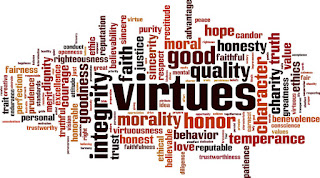A634.9.4.RB- A Reflection of Our Learning
Select three key lessons you take away from the course.
Probably
the most important aspects that I take away from this class were through the
shared experiences. Ethics can be confusing at times but yet is also fabricated
out of every facet of human interaction. Throughout this class I’ve learned
that people need to be more self-aware of their actions in order to honor both
morality and ethics. The numerous dilemmas presented in this course allowed for
a careful dissection and fullest understanding of many different perceptions. If
we understand better then we can act better. Critical thinking is not the
ability to have creative thought for which most people think, but rather it’s a
perceptual understanding that respects all facets that affect the sender.
Share if your perception of ethics has changed.
For
me personally I came into this class with the perception of ethics being how
actions are viewed externally. I still stand firm on these beliefs but now have
a better perception of how others view them. Paying respect to the myriad of
lenses really helps the individual to navigate hybrid dilemmas for which I
refer to as wicked problems. Egoism is one area that I initially took with
negative connotation but have realized in-fact it’s not. Just because you have
self-interest in some form or facet isn’t a bad thing at all. No one can
pinpoint why we have certain callings in life, and who knows maybe it’s a
genetics thing? Fulfilling those desires that makes you the best you that can
also operate at its fullest potential benefits many different facets.
Has this course expanded your perspective on ethics
as an individual, in an organization, and in society? If so, how. If not, why
not?
I
think at a personal level that the differences between a consequentialist and
deontologist will help me to have a better understanding as to why people
rationalize actions differently. If I’m trying to justify actions to a
deontologist when I have clearly operated in the gray about a given situation
then it is likely that I’m not going to sell it. As far as my behaviors in
society goes, the principles of relativism help to explain that ethics aren’t
just defined by our borders, but rather certain societies within can have
different perceptions of ethics. I sort-of find a middle ground between the
individual and society aspects of a given organization through pragmatism. This
is where you have to take your individual and societal norms and make them both
more respectful and professional. Respectful by means of personal interactions,
and professional by paying respect to your organization’s vision.
Provide the grade you feel you deserve and why?
For me it’s hard to quantify a grade in this class
because I think you can’t think quantitatively about it but rather
qualitatively, which is harder to define. How do you as a teacher really know
that I have taken anything away from this course except through my ability to
write and convey that message? How do you know that I will seek to honor what
has been presented here in my actual behaviors with respect to the profession?
I guess the best metric you could use needs to be seen from a level of
participation. Did I participate and really seek to challenge others which
allows me to learn in return? I know I feel like I really challenged both
myself and others to think about the process in which we perceive, which wasn’t
easy, but shows that I care. This course was probably my favorite thus far in
formal education because it wasn’t all about content learning but rather
experiential learning. I’m not one to brag but I think I did a very good job
with providing meaningful content but maybe not the best at scholarly writing
that provides reinforcement or contrasting views. So over all I’d say I’m at
about 95.33486% (ish) Thanks again for all your candor and meaningful
insight, your effort undoubtedly shows!
References
LaFollette, H. (2007).
The Practice of Ethics. Malden, MA: Blackwell.




Comments
Post a Comment